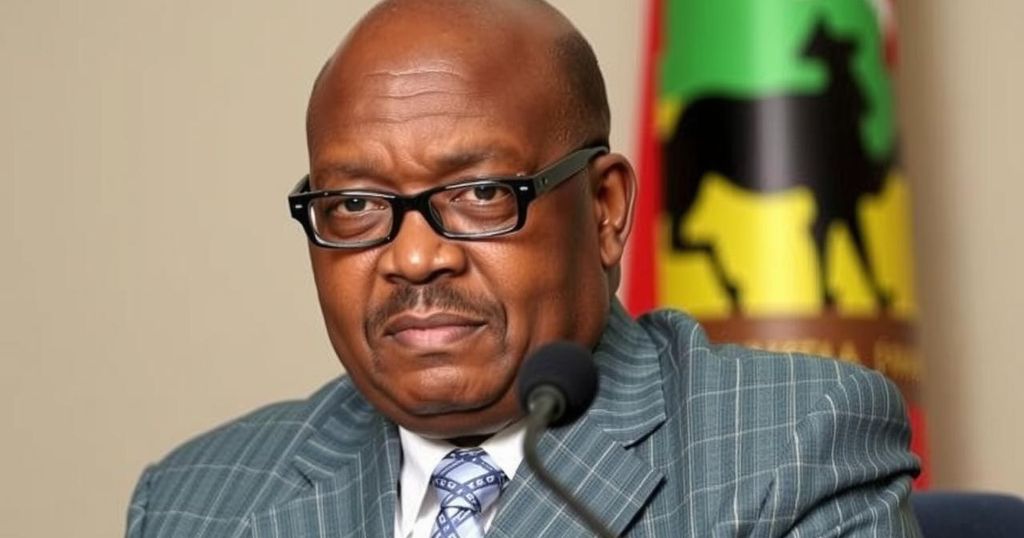Nandi-Ndaitwah Refutes Zimbabwe’s Alleged Interference in Namibia Elections

Namibia’s President-elect Netumbo Nandi-Ndaitwah has rejected claims of Zimbabwean interference in the recent elections, responding to accusations from five opposition parties. The opposition raised concerns without providing evidence, linking electoral issues to alleged tactics used by Zanu-PF. While logistical issues hampered the elections, both Swapo and Zanu-PF have denied any wrongdoing.
Namibia’s first female President-elect, Netumbo Nandi-Ndaitwah, has categorically rejected allegations asserting that Zimbabwe interfered in the country’s recent presidential and National Assembly elections. These claims originated from five opposition groups, which suggested that Zimbabwe’s ruling party, Zanu-PF, exerted influence over the electoral process that resulted in a victory for Swapo. The opposition parties, including the Independent Patriots for Change (IPC), Landless People’s Movement (LPM), Affirmative Repositioning (AR), All People’s Party (APP), and Popular Democratic Movement (PDM), provided no substantial evidence to support their allegations while voicing serious concerns regarding Zanu-PF’s involvement.
Additionally, LPM leader Ivan Skrywer drew a parallel between the alleged lack of ballot papers in Namibia and similar alleged tactics employed by Zanu-PF in Zimbabwe, stating, “If we look at the election results in Zimbabwe last year, this was the tactic used on day one.” Furthermore, IPC spokesperson Imms Nashinge questioned Zanu-PF’s premature announcements concerning Swapo’s win, asking, “How do they know? Is Namibia a province of Zimbabwe? Since when has Zimbabwe had so much interest in our affairs?”
In response, Nandi-Ndaitwah labeled the accusations as unfounded and part of a conspiracy aimed at tarnishing the image of Swapo. During a speech in Windhoek, she urged investigative journalists to probe the allegations thoroughly, asserting, “Those saying it, they know it’s not true, but they are saying it deliberately to confuse our people.” The elections faced numerous logistical challenges, including shortages of ballot materials and technical malfunctions leading to extended queues and voting delays. Critics have pointed out that these complications may have suppressed voter turnout, particularly in the Khomas region. Accusations have also been leveled against Namibia’s Electoral Commission for its lack of adequate preparation, raising questions about the legality of extending the voting period by two days.
Despite the allegations, representatives from both Zanu-PF and Swapo have dismissed the claims, with Zanu-PF’s secretary-general, Obert Mpofu, describing the allegations as reflective of “primitive thinking.”
The recent presidential and National Assembly elections in Namibia have been marred by controversy, as several opposition parties have accused the ruling party, Swapo, of being influenced by Zimbabwe’s Zanu-PF party. These allegations arise amid logistical challenges encountered during the election process, such as ballot shortages and accusations of inadequate preparation by the electoral commission. Understanding the dynamics between Namibia and Zimbabwe, alongside the historical context of political interference, is important to assess these claims and their implications for Namibian democracy.
In summary, Netumbo Nandi-Ndaitwah has firmly denied allegations of Zimbabwean interference in Namibia’s recent elections, labeling them as baseless and a deliberate attempt to mislead the public. The allegations have emerged against a backdrop of significant logistical challenges during the elections. Both Zanu-PF and Swapo officials have condemned the claims, asserting that they are unfounded and demonstrate a misunderstanding of regional political relations.
Original Source: newscentral.africa







